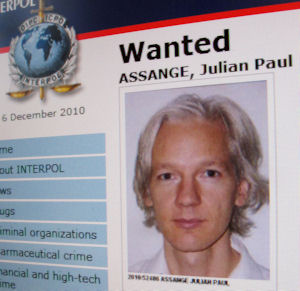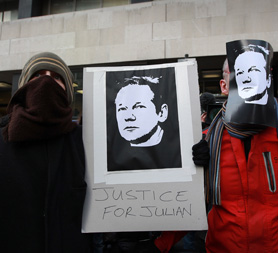WikiLeaks’ Julian Assange granted bail
WikiLeaks founder Julian Assange is granted conditional bail but remains in custody after what his lawyer told Channel 4 News was a “vindictive campaign” by Swedish prosecutors.

Julian Assange is wanted by prosecutors in Sweden over claims that he sexually assaulted two women. He was remanded in custody a week ago but his legal team made a successful appeal against the decision, with several well-known backers again offering thousands of pounds in sureties.
Mr Assange, the founder of WikiLeaks, was bailed on condition of providing a security of £200,000 to the court and two guaranteed sureties of £20,000 each. But he will remain in custody for up to 48 hours longer, pending an appeal requested by the Swedish authorities.
Mr Assange’s solicitor, Mark Stephens, said the prosecution was “turning into a show trial”, but his client was “phlegmatic” about the latest delay.
“The Swedes will not abide with the umpire’s decision and they want to put Mr Assange through yet more trouble, more expense and more hurdles.” Defence solicitor Mark Stephens
“Finally, after two hours we have heard that the Swedes will not abide with the umpire’s decision and they want to put Mr Assange through yet more trouble, more expense and more hurdles,” he said.
In an interview with Channel 4 News, Mr Stephens said that the Swedish appeal “smacks of a highly-politicised stunt”.
“This is just the Swedes continuing with their vindictive campaign – spending any amount of money to ensure Julian Assange stays in jail.”
Bail conditions
The District Judge Howard Riddle ordered that his passport should be held by the police, that he should stay on a 600-acre estate in Suffolk belonging to a friend and abide by a curfew. He will be tagged and must report to a local police station every evening if he is eventually released.
He will return to Westminster Magistrates Court for a further hearing on 11 January.
Mr Assange turned himself into police after an international warrant was issued accusing him of sex offences in Sweden.
Charges are thought to include rape and molestation in one case, and molestation and unlawful coercion in a second. Mr Assange has denied the allegations, which he has claimed stem from a dispute over “consensual but unprotected sex.”
He has vowed to fight extradition to Sweden.

Prior to Julian Assange’s appearance, City of Westminster Magistrates Court was besieged by protesters and media, with hundreds of people descending on the court.
Earlier it had emerged that campaigner Michael Moore had also offered to stand as surety for Mr Assange’s bail.
Crowd
Photographers and cameramen from around the world made the small entrance almost impassable. Dozens of police officers corralled a vocal and diverse protest behind metal fencing on the other side of the road.
A squad of officers helped celebrity Jemima Khan as she walked into court amid chaotic scenes to again offer a cash surety while veteran journalist and campaigner John Pilger, who has also put up cash bail, pushed his way through the scrum.
Among those leading the protest were gay rights activist Peter Tatchell and Lindsey German of the Stop the War campaign group.
Some demonstrators wore masks representing comic book hero V, from V for Vendetta, and others used scarves to conceal their identity.
Many carried placards mocking the British and Swedish authorities as well as black and white images of Julian Assange.
One read: “Sweden, puppets of the US”, another said “There is something rotten in the state of Sweden” and many said: “Exposing war crimes is not a crime”.
Mother
Mr Assange’s mother is in London to support her son, and said he stands by the release of confidential cables.
She said she is determined to support him, and urged others to do the same: “As a mother I am asking the world to stand up for my brave son,” she told Australia’s Network Seven.
WikiLeaks spokesperson Kristinn Hrafnsson who also arrived at the courts on Tuesday has maintained that the website would continue its operations and that developments in Assange’s case could not alter the track “laid out before.”
Lawyers for Julian Assange have voiced fears that U.S. prosecutors may be preparing to indict him for espionage. The WikiLeaks website provoked U.S. fury by publishing secret diplomatic cables.
The U.S. Justice Department has been looking into a range of criminal charges, including violations of the 1917 Espionage Act.




